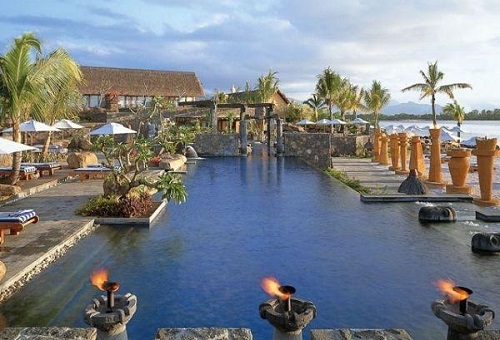
High demand growth, the arrival of new global brands and increasing supply in major markets has driven sub-Saharan Africa's hotel sector over the past decade, according to a new report from JLL. “This evolution is resulting in increasingly experienced investors developing products that are better suited to address demand, which is providing a clear shift in focus to the domestically driven midscale and budget segments,” Xander Nijnens, EVP of the hotels & hospitality group at JLL Sub-Saharan Africa, said in a statement.
JLL's sector report on hotel real estate on the African continent indicated that hotel operating performance in sub-Saharan Africa in 2016 and 2017 has been challenging. While the long-term investment case is mostly strong, the economic slowdown has affected demand at a time when new supply growth has been strong in many markets.
Still, Nijnens said, there are plenty of opportunities in new markets and new segments. Supply growth in the sector is continuing, ownership structures are evolving, liquidity is increasing, and many new prospects are becoming apparent in alternative markets and secondary cities, as well as product diversification.
Growing Markets
“Sub-Sahara Africa economies are far from mature, but some are further down the road to maturity than others and as a region we are turning increasingly optimistic on the outlook for the next 12-18 months,” said Tom Mundy, head of sub-Saharan Africa research for JLL. “While we acknowledge the lack of homogeneity across the region and that some countries will grow at a faster pace than others, we believe that the region has turned a corner after the recent commodity-driven slump.”
While some markets “have suffered” from fluctuating exchange rates and slumping inward investment, Mundy emphasized that others have benefited from more balanced economies, reduced “political intrigue” and a lower reliance on commodity cycle.
“When we asked leading investors what their intended short- and long-term exposure is to hotel assets in Africa, none indicated that they plan to decrease their exposure,” Nijnens said. To the contrary, Nijnens said that investors are looking to increase their short- and long-term exposure to hotels. As the sector matures, these investors are looking to recycle their capital into new projects through sales. These new projects will, in turn, bring fresh equity into the sector.
So long as the right supply and demand balance in key markets can be maintained, JLL expects the balance to provide continued investment and improving liquidity.
What Investors Need to Know
With saturation in key markets, investors are getting smarter about understanding demand. As such, JLL reported high growth in the budget and midscale space—a sector that is often overlooked in favor of more prestigious segments.
Investment is driven by local entrepreneurs and diversified corporate groups, with foreign capital being deployed into the sector at a lesser rate. These local investors price risk differently in their home markets than global investors do—creating a gap in value expectations between these investor groups. With an expected increase in liquidity, this gap should narrow.
According to Nijnens, effective lending on hotel assets remains challenging in sub-Saharan Africa, and these challenges are reducing transactional liquidity and supply growth. At the same time, he said, lenders are right to be wary of certain markets. There is also a higher volatility in lending to hotels with management contracts compared to other asset classes with leases in place. “As the hotel sector matures and there is a larger volume of successful developments and exits, more evidence of fully repaid loans, more experienced promoters and increasing institutional capital entering the sector, we will see the lending space evolve,” Nijnens said, emphasizing an opportunity for sensible hotel lending by commercial lenders who invest time and resources to understanding the sector and can better manage and price risk.
Upcoming Development
Throughout the week, numerous global hotel companies have detailed their growth plans for Africa. Marriott International has signed deals to open seven new hotels consisting of 1,300 guestrooms across several new markets, and Minor Hotels' Avani Hotels & Resorts brand has teamed up with Groupe Chaabane to debut in North Africa with two new properties in Tunisia. Hilton, meanwhile, is set to invest a total of $50 million over the next five years toward the Hilton Africa Growth Initiative to support the continued expansion of its sub-Saharan African portfolio.
Other brands and companies are also gaining ground in growing markets. When it opens in 2020, the Mövenpick Hotel Abidjan will be the company's first property in Côte d'Ivoire and one of four currently in active development in the region. The other three are Mövenpick Hotel & Residences Nairobi in Kenya (on track to open in 2018), Mövenpick Hotel Addis Ababa in Ethiopia (set to open in 2019) and Mövenpick Hotel & Conference Centre Abuja in Nigeria (set for completion in 2020). Mövenpick Hotels & Resorts currently operates the 260-guestroom Mövenpick Ambassador Hotel Accra in Ghana.
The Park Inn by Radisson brand, meanwhile, will debut in Ethiopia when it opens the Park Inn by Radisson Addis Ababa. The Carlson Rezidor Hotel Group has 82 hotels and over 17,400 guestrooms in operation and in development across Africa.









Service Hotline
Work Time:Mon-Fri 9:00-18:00
UTC+8

Sinoexpo Digital Platform
Copyright 2006-2024 Shanghai Sinoexpo Informa Markets International Exhibition Co., Ltd. All rights reserved
沪ICP备05034851号-77
 沪公网安备 31010402000543号
沪公网安备 31010402000543号